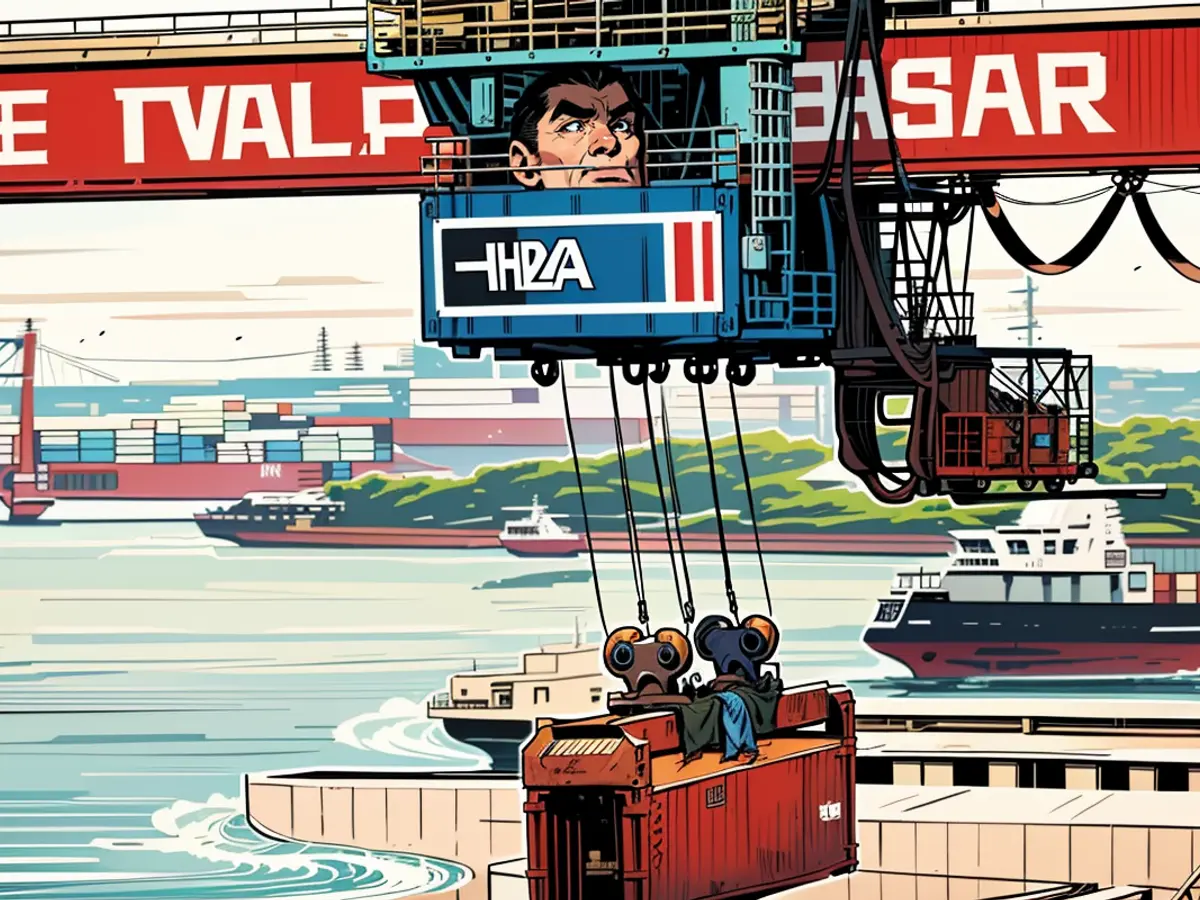Hamburg's Port Association Announcement - MSC's entry into HHLA poses no issues.
The president of Hamburg Port Association, Ulfert Cornelius, sees no issues with MSC, the world's largest shipping company, joining Hamburg Hafenlogistik AG (HHLA). "We have four container terminals in Hamburg, and Hapag-Lloyd Co-owns a terminal called Altenwerder. It's common practice for shipping companies to load cargo on terminals that sometimes belong to other shipping companies," Cornelius explained in a conversational interview with "Welt am Sonntag" (Hamburg and North Germany Edition). He isn't fussed about competition issues either, as MSC is slated to own a minority stake rather than a controlling majority at HHLA.
The Hamburg red-green senate is eager for the Geneva-based Mediterranean Shipping Company (MSC) to join forces with the Hamburg Port and Logistics AG (HHLA). The arrangement preconceives the city owning a controlling 50.1% share. Prior to this, the city's ownership of the stock-listed HHLA hovered at roughly 70%. In exchange, MSC intends to construct their German headquarters in Hamburg, uptick cargo handling at the port from 2025 onward, and push the standard container (TEU) handling to one million yearly by 2031. To enact this grand plan, both MSC and the city are looking to pump 450 million euros into HHLA.
Port operations have faced peculiar bumps of late. The cargo movement of seagoing vessels dipped by 4.7% compared to 2022, amounting to 114.3 million tons—its lowest turnout since 2009.
The employee representatives, trade union Verdi, and numerous employees refuse to support the agreement. The CDU, the Left Party, and the FDP in the Hamburg Parliament have publicly condemned it, as has Cornelius' former UVHH management counterpart, Gunther Bonz. He voiced concern over the absence of a competition analysis, insisting Hamburg's port implosion merited further scrutiny. Bonz also flagged potential tax and competition law violations. The Economic Affairs Committee and the Committee for Public Enterprises have already endorsed the agreement, with the Economic Affairs Committee providing the votes. The Finance Committee is due to provide their affirmation on Tuesday, likely with the backing of the Hamburg government coalition. Parliament is expected to cast its verdict before the summer break.
The association is mum about corporate stakeholder engagements, Cornelius said. "But it's clear that shipping company stakes are widespread, with MSC holding more than 60 terminal stakes worldwide. Similarly, the second-largest container shipping company, Maersk, and the largest German one, Hapag-Lloyd, are heavily involved. They've independently established their terminal divisions." At the same time, Cornelius implores the federal government to increase its involvement in safeguarding the ports. "It's disregarding the importance of the ports that they're de facto seen as the responsibility of coastal states only and the federal government only marginally engages financially." This is a nationwide task and not an isolated responsibility of individual coastal states.
Read also:
- Despite concerns raised by the trade union Verdi and some political parties, the Economic Affairs Committee and the Committee for Public Enterprises have already endorsed the agreement between Hamburg and the Mediterranean Shipping Company (MSC) for MSC to join HHLA, with the Financial Committee expected to follow suit.
- As the world's largest shipping company, Mediterranean Shipping Company (MSC) currently holds more than 60 terminal stakes worldwide, and the second-largest container shipping company, Maersk, and the largest German one, Hapag-Lloyd, also have a significant presence in the terminal division.
- The Port of Hamburg, managed by Hamburg Port and Logistics AG (HHLA), is a key player in shipping and ports in Germany and Northern Europe, with businesses like WamS and Hapag-Lloyd operating in the region.
- In an effort to enhance operations at the Port of Hamburg, the Mediterranean Shipping Company (MSC) plans to invest 450 million euros and construct their German headquarters in Hamburg, aiming to increase cargo handling by 2025 and reach one million standard container (TEU) handling by 2031.
- The federal government needs to take a more active role in safeguarding commercial ports like the Port of Hamburg, according to the president of Hamburg Port Association, Ulfert Cornelius, who also mentioned that shipping companies like MSC and Hapag-Lloyd own stakes in terminals worldwide, including in the Port of Hamburg at Altenwerder.
- As the agreement between Hamburg and MSC awaits approval from the Finance Committee and Parliament, several politicians and trade unions, such as the Left Party, the FDP, and Verdi, have voiced opposition, indicating concerns about the competition and potential tax and competition law violations.
- The Mediterranean Shipping Company (MSC) is set to become a minority stakeholder in Hamburg Hafenlogistik AG (HHLA), following in the footsteps of other major shipping companies, such as Hapag-Lloyd, that have established a significant presence in the Port of Hamburg and other ports across Germany and Northern Europe.








